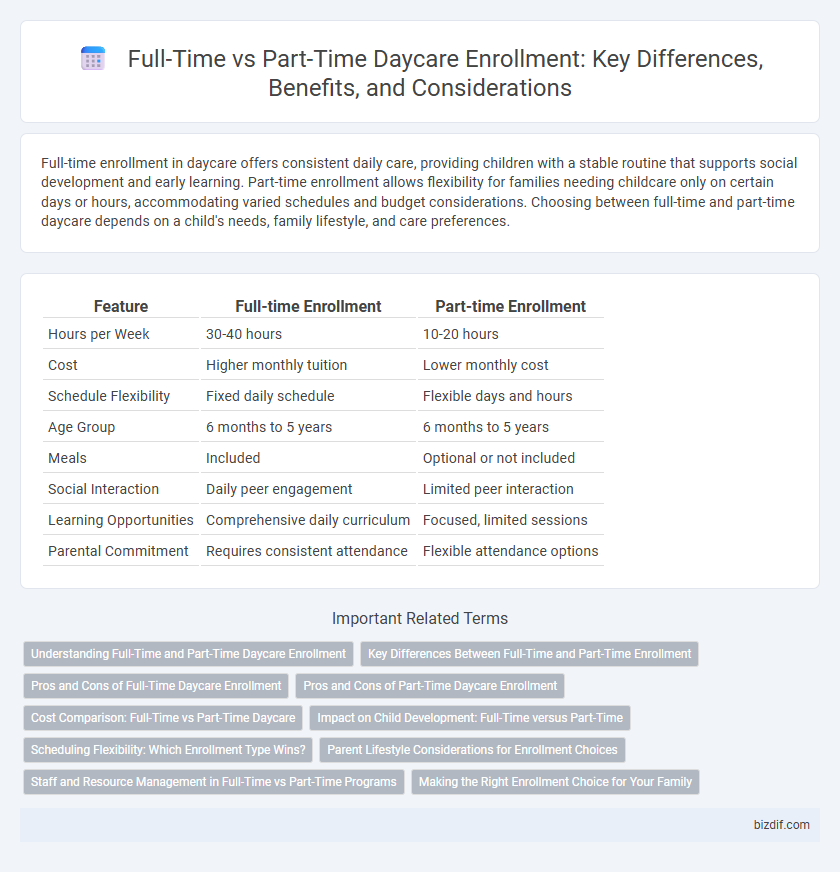Full-time enrollment in daycare offers consistent daily care, providing children with a stable routine that supports social development and early learning. Part-time enrollment allows flexibility for families needing childcare only on certain days or hours, accommodating varied schedules and budget considerations. Choosing between full-time and part-time daycare depends on a child's needs, family lifestyle, and care preferences.
Table of Comparison
| Feature | Full-time Enrollment | Part-time Enrollment |
|---|---|---|
| Hours per Week | 30-40 hours | 10-20 hours |
| Cost | Higher monthly tuition | Lower monthly cost |
| Schedule Flexibility | Fixed daily schedule | Flexible days and hours |
| Age Group | 6 months to 5 years | 6 months to 5 years |
| Meals | Included | Optional or not included |
| Social Interaction | Daily peer engagement | Limited peer interaction |
| Learning Opportunities | Comprehensive daily curriculum | Focused, limited sessions |
| Parental Commitment | Requires consistent attendance | Flexible attendance options |
Understanding Full-Time and Part-Time Daycare Enrollment
Full-time daycare enrollment typically involves children attending care for 30 to 40 hours per week, providing consistent daily routines that support early childhood development and offer reliable childcare for working parents. Part-time enrollment offers flexible scheduling options, often ranging from a few hours to several days per week, catering to families needing occasional or reduced care and promoting socialization with a lighter time commitment. Understanding the differences between full-time and part-time daycare enrollment helps parents balance childcare needs with work schedules, budget considerations, and their child's developmental requirements.
Key Differences Between Full-Time and Part-Time Enrollment
Full-time enrollment in daycare typically involves children attending for eight hours or more per day, providing consistent routine and social interaction, which supports developmental milestones and learning continuity. Part-time enrollment usually consists of fewer hours per day or fewer days per week, offering flexibility for parents but potentially less structured learning and socialization time for the child. Costs also differ significantly, with full-time enrollment generally priced higher due to extended care services and resources provided.
Pros and Cons of Full-Time Daycare Enrollment
Full-time daycare enrollment offers consistent childcare from 8 to 10 hours daily, promoting routine and social development for children aged 6 weeks to 5 years. It provides working parents with reliable scheduling and comprehensive care but may expose children to increased illness risk and higher costs compared to part-time options. Full-time attendance supports early learning and peer interaction, though it can lead to potential burnout or less family bonding time.
Pros and Cons of Part-Time Daycare Enrollment
Part-time daycare enrollment offers flexibility for parents who need occasional childcare, reducing overall costs compared to full-time care. However, limited hours may impact a child's socialization opportunities and routine consistency, which are essential for early development. Families must weigh affordability and schedule adaptability against potential drawbacks in structured learning and peer interaction.
Cost Comparison: Full-Time vs Part-Time Daycare
Full-time daycare enrollment typically costs more due to extended hours and comprehensive care, often ranging from $800 to $1,200 per month depending on location and facility quality. Part-time daycare offers a more budget-friendly option, averaging $400 to $700 monthly, ideal for families needing fewer hours of care. Evaluating cost per hour reveals part-time care is generally more economical, though full-time enrollment may provide better value for families requiring consistent daily supervision.
Impact on Child Development: Full-Time versus Part-Time
Full-time daycare enrollment provides children with consistent routines and extended social interaction, which can enhance cognitive, emotional, and language development through continuous learning opportunities. Part-time enrollment offers flexibility and allows for more individualized parental engagement, which may support emotional security and tailored developmental pacing. Research indicates that full-time attendance is linked with stronger peer relationships and advanced skill acquisition, while part-time care supports balanced family involvement and gradual socialization.
Scheduling Flexibility: Which Enrollment Type Wins?
Full-time enrollment in daycare offers consistent scheduling that supports parents with fixed work hours, ensuring comprehensive daily care and routine stability for children. Part-time enrollment provides greater scheduling flexibility, ideal for families requiring occasional or variable childcare needs without committing to a full-day program. Choosing the best option depends on balancing parental work demands with the child's social and developmental requirements.
Parent Lifestyle Considerations for Enrollment Choices
Full-time enrollment in daycare suits parents with demanding work schedules or those seeking consistent childcare support, allowing for predictable routines and comprehensive child development activities. Part-time enrollment appeals to parents with flexible work hours or those balancing caregiving responsibilities, offering cost-effectiveness and opportunities for children to socialize while maintaining parental involvement. Understanding family lifestyle, work commitments, and childcare budget plays a crucial role in deciding between full-time and part-time daycare options.
Staff and Resource Management in Full-Time vs Part-Time Programs
Full-time enrollment in daycare centers demands higher staff-to-child ratios to comply with regulatory standards, ensuring effective supervision and personalized care. Part-time programs permit more flexible staffing schedules and resource allocation, allowing for cost efficiencies while maintaining quality. Efficient management balances staffing levels and available resources to meet the distinct needs of full-time and part-time enrollees, optimizing operational effectiveness.
Making the Right Enrollment Choice for Your Family
Choosing between full-time and part-time daycare enrollment depends on your family's schedule, budget, and child's social development needs. Full-time enrollment offers consistent care and structured activities that support early learning, while part-time enrollment provides flexibility for families with irregular schedules or additional caregivers. Evaluating your child's routine, your work commitments, and financial considerations ensures the enrollment choice aligns with your family's priorities and promotes your child's well-being.
Full-time enrollment vs Part-time enrollment Infographic

 bizdif.com
bizdif.com